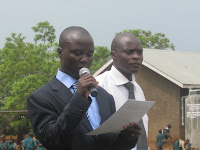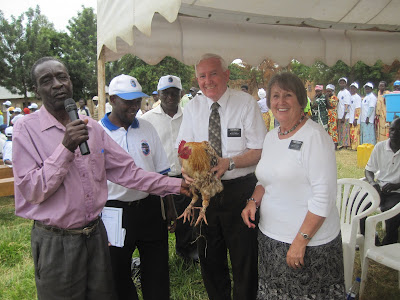It is a beautiful farming community with a variety of crops: Cassava, Sweet potatoes, Groundnuts, Sorghum, Millet, Peas, Simsim, Cotton, Sunflower, Rice, Maize, Beans, Soybeans, and oranges .
Along with the farming of crops there is the raising of cattle and goats. Seems prosperous enough but today they are struggling with a severe drought which the government now predicts will turn into a famine in a few months. Hard to believe since just south of Amuria is the wetlands where there is water in abundance.
Life is difficult - poverty is common. Seems like they just can't get a leg up before something else hits them to push them down.
Back in January we received a request from Minister Ecweru, Minister of Emergency, Disaster Relief and Refugees, to have a water project in Amuria. Easy enough request but a hard project to get organized and started as the area is very remote and
many of the roads are not roads but trails making it difficult to work in the areas. Homes are very spartan in that as soon as you leave the town proper everyone lives in a mud hut with a thatched roof.
Interesting sites with in the city limits - a view of a bygone street light and yes that is a little tiny light bulb dangling from the fixture.
A school bus loaded with children, Actually we have seen 50 children in the back of a truck just standing and hanging on to the sides so this bus at least has seats.
It is not unusual to see goats sitting in the median of main street or cows walking down the middle of the road downtown. (Whose cows are they anyway?)
Taxis in this area are a bit different also, after all we are out in the country.
Some taxis are more familiar looking but in Amuria they are always loaded and you never know what you will see riding on top, a goat, chickens.
Now you have a picture of Amuria. A little bit of contemporary but a whole lot of country.
Seems Amuria does things a little bit different on these water projects and instead of getting right down to business you have to have a FLAG OFF to get the project started. (Flag off? What is that?)
We printed a banner as requested and headed to the Flag Off celebration. But since the ceremony was suppose to start at 10:00 AM we decided to visit a few of the schools we are going to be working on.
Old latrines will be replaced with new latrines along with each of the 15 schools getting a rainwater catchment system.
As a mission farewell gesture we have decided to give each school a tree to commemorate the project. We planted a Mango tree at two schools this trip
 |
| Senior girl Perfect (note the headband Ryan which we gave her for helping us plant the tree.) |
At the second school we visited we found all the girls crocheting.
With a safety pin! Who would have thought. They were quite adept at it too. They were using a very stiff thread and it made a very tight stitch but very pretty how they were doing the color weave.
Bright eyes full of hope and joy. African children are good at finding ways to be happy and joyful.
Well, it was12:00 pm and we decided it must be time for the 10:00 am Flag Off (Ugandan time)..
As we drove into the clearing in the village there was the banner and several people peering through the brush. As soon as they saw us coming they started to dance and sing.
We got out of the car and they led us in with singing and dancing, yelling and warbling.and the waving of leaf bouquets, a sign of good fortune and celebration.
We sat under a very large old hardwood tree
while we listened to the music and singing of the local band. The music was very good especially considering it was made on local homemade instruments.
Harriet asked if she could translate the ceremony for me as it was in the local language. Nearly every village in this area of Uganda has their own language. Most people end us speaking about 5 languages in Uganda including English and Lugandan
The man who donated the land for this borehole welcomed us and thanked the church for giving his community water to relieve their suffering.
He was dressed in his best suit and danced for us in celebrating the beginning of the drilling
It wasn't long till Betty our community Hygiene/Sanitation trainer was so into the celebration that she pulled us up to dance with the group
Then everyone was up dancing and celebrating including all the district officers who had come to speak at the Flag Off.
Each song that was sung reinforced the joy of getting clean water, improving the sanitation of the community and helping families to be healthy and avoid disease.
Another song was sung by the village group
" One day God will ask what you have done.
We will all be judged by what we have given.
We pray to God to take care of all the people.
Who can save the world?
The one who can save the children,
Who can save the women,
Who can save the men.
Everyone has to be accountable for what they do while living."
The Deputy Commissioner of Amuria guaranteed that Amuria will own this project. He said that the district had 61% clean water coverage and 58% sanitation coverage. The church's water project would improve these statistics considerably with the wells, latrines, family latrine slabs and hygiene and sanitation training.
Elder Barlow introduced the team to the community. He explained that this was the team that would be working in their community to make the project happen. It was important for each community to work with the team for a successful project.
Minster Ecweru's representative, Moses recognized Ssimbwa as a good liason for the church as he has worked to establish the borehole sites with the district. He stated that the gift from the church far exceeded what the district had budgeted for the year. He acknowledge the impact such a project will have on the health of families. He also explained the uniqueness of the project in providing things that the District had never included in their budget but would now like to make standard for projects in the District such as the girls washroom in the latrine and the clothes washing stations at the water sites. He stated that the community should appreciate the practicality of the project and the thought that went into the planning to make the most of the project.
The District chairman Alumee LC5 talked about the history of suffering in the area with the wars and unrest along with the fluctuating flooding and drought. Much of the population have recently returned to the area and have started to reestablish their homes. The need for clean water is great and the project is very timely. He directed the new Disitrict Team to take advantage of this opportunity and work to gether to deliver the proper services to the community such as roads, well staffed health centers and additional water resources.
He declared the drilling officially launched.
2011 District Budget
9 school latrines
9 boreholes
Church project
15 school latrines with hand washing stations
15 school rainwater catchment systems
600 family latrine slabs
10 new boreholes
10 refurbished boreholes
10 clothes washing stations
20 communities Hygiene/Sanitation Training
15 schools Hygiene/Sanitation Training
They turned on the drilling machine and immediately there was water (staged a little but still an impressive site.
We planted trees to commemorate the Flag off and to leave the community a symbol of the growing change coming to their community.
The owner of the property for this first well obviously was suffering from cataracts as was his wife.
Time to leave we had a long ride home, 6 hours to Kampala.
Three stops on the way home. Farrell had to gas up at the TOTAL Station for our long trek home.
I had to visit the Thursday market and buy some baskets I couldn't live without
Ssimbwa had to stop and buy some newly harvested rice to feed his school children.
A great trip to Amuria.
The water project has begun.
A Flag Off!
That was a first for us.





































































